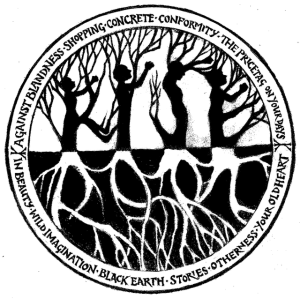
Rise and Root, by Dark Mountain artist, Rima Staines (http://intothehermitage.blogspot.co.uk/2012/01/rise-root.html)
Some thoughts after attending the Uncivlisation 2012 Festival, August 2012
Now in its third year, the Uncivlisation Festival brought together writers, artists and thinkers who have stopped believing the stories that they feel civilisation tells itself. They see an age of ecological collapse and social and economic unravelling, where others see ongoing “progress”. They believe that mainstream culture is too closely associated with control, measurement, growth, reason and disconnection from nature. “Uncivilisation” aims to change our story into one which challenges denial about our situation, and offers hope to people seeking new ways of being, rooted in place, time and nature.
The project’s first publication, The Dark Mountain Manifesto, set out the project’s case for change and the kind of artistic response that authors Paul Kingsnorth and Dougald Hine felt was required.
The third Dark Mountain book (launch Liverpool, September 2012), like its two predecessors, is a wide ranging and eclectic mix of essays, fiction, poetry, visual art and interviews by “uncivilised” writers and artists. One piece, for example, proposes a “Dark Ecology”, considering how people might respond personally to times of significant change. Another celebrates “the vernacular” and the possibility of “re-homing” society to become more self-reliant, more locally rooted and less money based.
I attended the Uncivilisation 2012 Festival at the Sustainability Centre, near East Meon in Hampshire. The Festival included readings, discussions, participatory theatre, photography and art installations, activities for kids, and a decidedly edgy programme of live acoustic music in Ben Law’s timber-framed woodland class room, turned “woodland stage”, candle lit and very atmospheric, among the trees.
I used the experience to reflect upon the Dark Mountain Project, and what lessons it might have for those working in the arts and in community settings who are trying to bring about positive change. In trying to understand what Dark Mountain is doing and how, I was struck by the way the project values the marginal and edges (one of David Holmgren’s Permaculture principles); how it gives people a sense of belonging; and how it emphasises the importance of connecting with people through their felt experience, rather than overwhelming them with data and science.
Valuing the marginal
In rejecting “business as usual” based on a materialistic idea of “progress”, Dark Mountain can raise uncomfortable and unwelcome questions for the mainstream. While many may find this alienating, it also has the benefit of bringing the marginal to the fore, and the marginal is often where the most interesting things happen. While some at the festival were concerned that the project was not reaching more sections of society (described by someone as the need to, “go beyond the tribe”), those at the festival were not just the “usual suspects”: as well as artists and writers, they included activists, transitioners, educators, academics, story tellers, permaculturalists, eco-villagers, squatters and travellers, to name a few. This very rich blend of people gave a particular edge to audience reaction to and participation in the programme of activities, and made possible a rich and surprising set of encounters and conversations.
Belonging
Another recurrent feeling in the Festival was that of belonging. A number of people expressed their belief that Dark Mountain gave them a space to be with others that share their concerns and feel free to talk about difficult issues like the despair felt in the face of what we are doing to the planet and each other; the erosion of old ways of being in the face of development and monoculture; and the struggles of trying to take positive action for a better future when you go against the mainstream. It was this sense of shared predicament and possibility that seemed to spawn a sea of conversations and creative thinking, based on empathy between people and concern for our home. Many felt they had “come home” by finding Dark Mountain.
Felt experience
There was discussion about the idea that environmentalism has failed, after waging a war based on numbers (think carbon, biodiversity and so on), which have just continued to get worse. Use of quantitative and money-based measures of “progress” were typically regarded with suspicion: perhaps the more we measure, the more we lose, and that loss can also be qualitative, incapable of being reduced to a mere number. In discussions people frequently came back to the importance of their felt experience – their emotional response – as being a more trusted guide to a better life, and the choices we make. The idea that creative work which engages people emotionally through their felt experience can best foster connection to the Earth and to each other, while also challenging the dominant culture, emerged as perhaps the most valuable contribution Dark Mountain has to make to the challenges we face.
